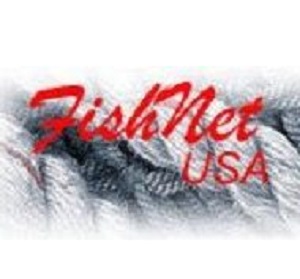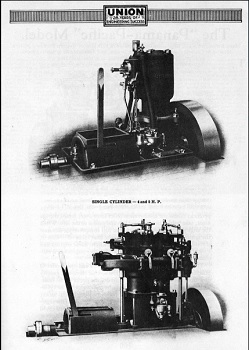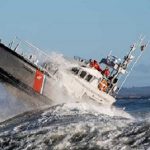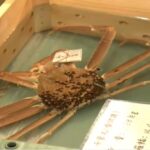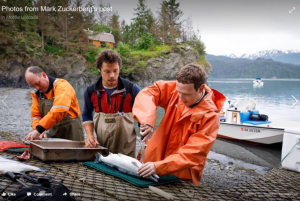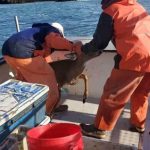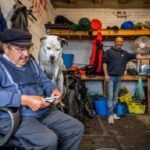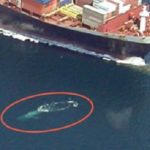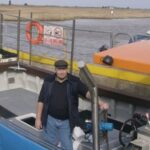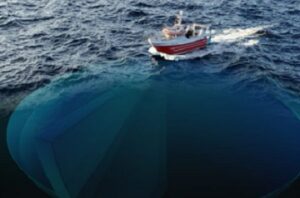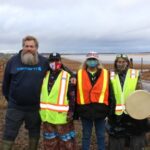Category Archives: Pacific
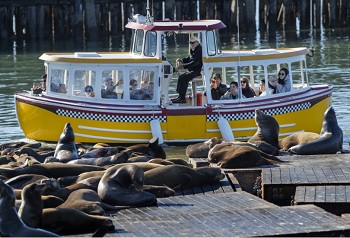
Sea lions are cash cows in the Bay Area. Farther south, fishermen say, ‘Shoot ‘em’
Sea lions are increasingly living in parallel universes along the California coast, a disparity best observed amid the noisy, stinking spectacle that rolls out daily at San Francisco’s Pier 39 shopping center. There, hundreds of these enormous, mostly male California sea lions bark, defecate, urinate and regurgitate, but are immensely popular with tourists.,, Officials in Washington, Oregon and Idaho are so irate at marauding sea lions that they have asked for federal permission to shoot certain ones identified as feasting on salmon and steelhead,,, >click to read< 10:01
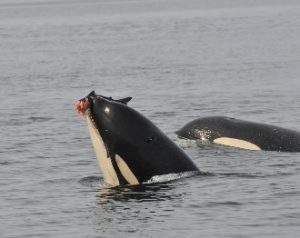
Four Washington Dams Again on Chopping Block
Farmers, fishermen and environmentalists sparred Thursday over a proposal to breach four dams on the Snake River to prevent extinction of salmon born there. The time could be ripe for the proposal long favored by environmentalists, with requirements under decades-running litigation dovetailing with measures called for by a state task force bent on saving endangered killer whales. The government is preparing to take an official position in February on whether breaching the four dams is necessary. >click to read< 20:31
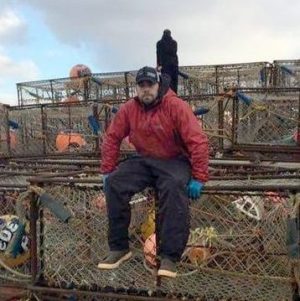
Battling the waves to stay alive: A tale of survival from the F/V Scandies Rose
For John Lawler, the only encouraging thing was a glow from a second life raft about a quarter-mile away. He hoped that light would stay on, and someone would find him and crewmate Dean Gribble Jr. in the pitch-black aftermath of Scandies Rose crab boat going down in the Gulf of Alaska. “We would lose sight of it because the waves were so big, but it would always reappear, ” said Lawler, a 34-year-old crabber from Anchorage, Alaska. >click to read< 18:51

Fishery FUNDD Act: Reps. Palazzo and Huffman Introduce Bipartisan Bill to Improve Federal Fisheries Disaster Relief Program
Representatives Steven Palazzo (MS-4) and Jared Huffman (CA-2) have introduced the Fishery Failures: Urgently Needed Disaster Declarations Act (Fishery FUNDD Act), which will improve the federal fishery disaster process and ensure more timely disaster relief for impacted communities. The Fishery FUNDD Act would set a timeline for the federal government to respond to a fishery disaster request, and set a timeline for disbursal of appropriated funds following a disaster. >click to read< 14:05
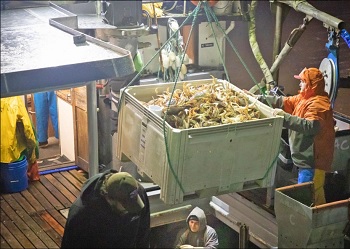
Crabbers brave ‘sloppy seas’ to start harvest
Fishing crews reported enduring ‘sloppy seas’ for most of the season so far. “It was a little rough,” said Paul Blaylock of the F/V Amanda C, upon delivering their first catch of the season on Jan. 2. “We got a little wet.” The weather has fishermen and processors hopeful for more favorable conditions in the coming days. “It’s been a struggle. The fishing windows are very narrow right now,” 11 photos, >click to read< 08:59
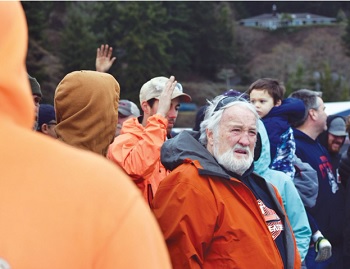
Fishermen bound for Alaska receive prayers
A crowd of people gathered at the Port of Newport International Terminal at noon on Tuesday, Jan. 7, where prayers were offered for local commercial fishermen who are headed this week to Alaska’s Bering Sea. South Beach Church Pastor Luke Frechette called everyone in. “Closer,” he said, as dozens of people — fishermen, their families and their friends — formed a circle. The large fishing vessels, geared up, lined the dock behind them. >click to read< 08:17

Future of offshore fish farming in federal waters at issue in court
The potential environmental and economic consequences posed by proposals for fish farming in federal waters dictate that Congress — not a federal agency — must decide how to regulate the industry, an attorney told a federal appeals court Monday. At issue before the 5th U.S. Circuit Court of Appeals was a September 2018 ruling by a federal judge who threw out National Oceanic and Atmospheric Administration’s rules for fish farms in the Gulf of Mexico, saying Congress never gave the agency authority to make them. >click to read< 14:58
Meet Chris Schillaci who Joins Greater Atlantic Region’s Aquaculture Program! – In December, Chris Schillaci joined the Greater Atlantic Region’s aquaculture program, bringing ten years of experience to his new role. We asked Chris a few questions as he was settling in. >Click to read<
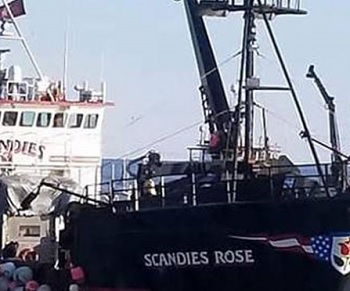
A ‘battleship’ of a crab boat – Owner of Alaska crab boat thought of Scandies Rose as unsinkable
The F/V Scandies Rose, which was managed out of Seattle, sank suddenly near Sutwik Island, off the coast of the Alaskan Peninsula. Two crew members were rescued by the Coast Guard from life rafts; the other five were not found. Two of the lost crew members and one of the survivors were from Washington. Dan Mattsen, who owns the Scandies Rose with two other partners, said he is still processing what happened. He is interviewed by KIRO Radio’s Dori Monson >click to read, listen< 19:27
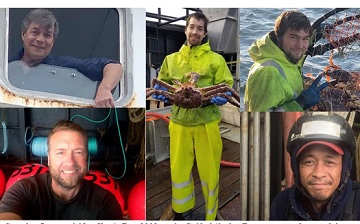
In Alaska, commercial fishing remains dangerous despite increased safety measures
Commercial fishing was once the most dangerous job in the country, (Scott Wilwert said, and during the 1970s and 1980s an increase in accidents and deaths ultimately led to the passage of the Commercial Fishing Industry Vessel Safety Act of 1988. The regulations required boats to have survival suits and life rafts and to carry out onboard safety drills, among other safety measures.,, “There was a time in the ’70s and ’80s where, I think, even the fishermen would tell you that there was a mentality, that ‘you have to go out but you don’t have to come back’ kind of thing,” Wilwert said. “That just doesn’t exist, nobody thinks that way anymore.” >click to read< 07:29
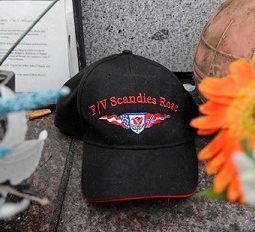
After the sinking of the F/V Scandies Rose, an aftermath of anguish
Before Alaska crabber Brock Rainey headed out to start a new season, he checked in with his longtime friend Mike Daily. This winter was no different. “Tossing lines for the Bering Sea today…Love you brother,” Rainey texted in the hours before the boat he crewed on, the Scandies Rose, left Kodiak on Monday. The 130-foot vessel never reached its next port. Rainey and four others, including two men from Washington, were not found during a 20-hour search that was called off Wednesday night. >click to read< 16:53
A Fundraiser has been started by Hailey and Lukas Engstrom for the family’s of F/V Scandies Rose – >Please click here<

F/V Scandies Rose: Survivor Dean Gribble Jr. describes 20-foot seas,”worst possible conditions.”- Calls to loved ones reveal rough conditions before sinking
In a YouTube video, Dean Gribble Jr. explains the people on board the Dutch Harbor-based vessel – with business operations out of Seattle – went “from sleeping to swimming” in about 10 minutes when the vessel began to capsize. “It happened really fast,” Gribble Jr. said. The video from Gribble Jr. can be seen in its entirety >click here< ,, Gribble Jr. says he and John Lawler were in a life raft for “five hours or so” before being rescued by a Jayhawk helicopter. They were wearing survival suits. >click to read< 14:18
Calls to loved ones reveal rough conditions before sinking – The 130-foot (40-meter) Scandies Rose was traveling in an area with warnings about strong winds and heavy freezing spray, said Louise Fode, a warning coordination meteorologist with the National Weather Service. >click to read< 14:39
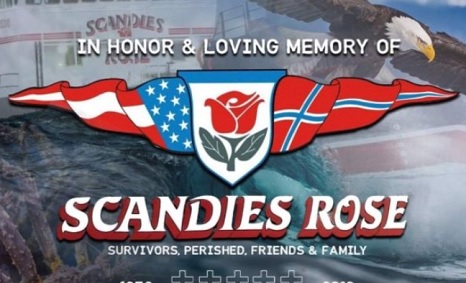
A Fundraiser has been started by Hailey and Lukas Engstrom for the family’s of F/V Scandies Rose
From the fundraiser, My name is Hailey Engstrom. My brother Lukas and I are raising money for the families that suffered this horrible tragedy. Our father, We Engstrom recently retired from the Scandies as the deck boss for 10 years, and with the company for nearly 20 years. Coming from a fishing family, this accident hit home with us extremely hard. >click to read< Please contribute to this fundraiser if you can! 08:36
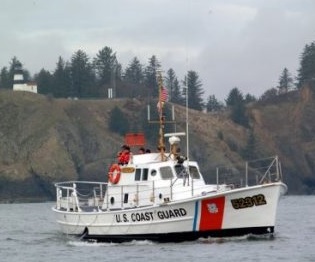
Coast Guard completes 5-hr tow of fishing vessel offshore Yachats, Ore.
A Coast Guard 47-foot Motor Lifeboat crew towed a disabled 52-foot commercial fishing vessel Tuesday night across the Yaquina Bay Bar approximately 2.5 miles northwest of Yachats, Oregon. Watchstanders at Coast Guard Sector North Bend received a report at 12:57 p.m. Tuesday that the 52-foot Pacific Cloud with three people aboard and 2,500 pounds of crab experienced a loss of power and were drifting toward the surf zone. >click to read< 13:17
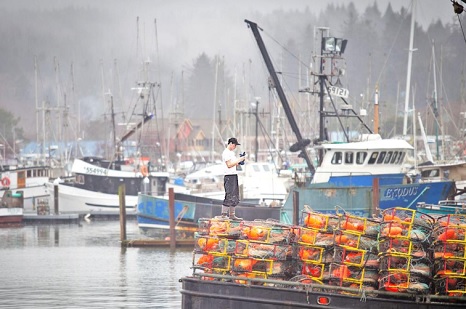
Crabbing commences: Rich fishery attracts out-of-area boats
“Just the excitement of it. There’s no quotas, may the best man win,” said F/V Nordic Fox captain Cub Jansen, 29, when asked about the appeal of the commercial Dungeness crab fishery. “It’s one of the last things you can do where hard work can really reward you.” Jansen, with crew Dru Rowe, Larry Bell, Cub Jansen, Mitch Clark and Raj Clark, was among several commercial skippers crabbing out of the Port of Ilwaco for the first time. 21 Photos. >click to read< 17:45

Commercial Crab season to start at $3 per pound
Commercial crab fishing season begins overnight into Tuesday with a $3-per-pound market price, roughly the same as the going rate in the Bay Area. The season’s start was delayed by a gap in meatiness (crab meat levels need to be at a certain level for fishing to begin) and lengthy negotiations over an official market price.,, As they have done ahead of past seasons, some crab fishermen worried about where price negotiations would wind up. Historically, crabbers have even gone on strike over market price disagreements. , >click to read< 08:34
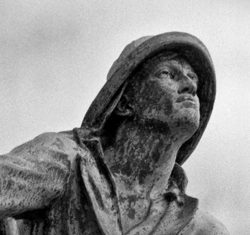
Sam Parisi: Its 2020 and time to move this industry forward!
Here we are again, at the end of the year, and decade for that matter, as 2019 is ending, and its time to move forward. As some of my fellow Fisherynation readers know, I am motivated to try improving the U.S. fishing industry for our country’s working U.S. fishermen. I have reached out to my Senators Markey, and Warren, and also to Congressman Moulton to help draft a US Fish Bill. This is an opportunity for everyone in this ridiculously diverse industry from sea urchin, and scallop divers, to clam dredgers, and every faction of the industry, traditional, and exotic, to have personal input into a bill built for you, built by you, and built by your fellow industry members. >click to read< 16:50
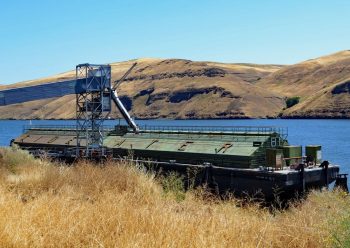
Letter: Fishing and farming communities need solutions
Washington Governor Jay Inslee’s draft report on the lower Snake River dams raises important questions about the future of our region’s salmon runs, energy and infrastructure. But one of the most important considerations in the report is the future of our rural economies — from here on the Pacific coast to the inland Northwest. Commercial salmon fishermen and wheat growers have a lot in common. We work hard and we have deep pride and commitment to the land and waters we call home. We also face similar challenges when it comes to keeping our communities vital and thriving. Too often, we feel we’ve been left behind. >click to read< by commercial fisherman Joel Kawahara
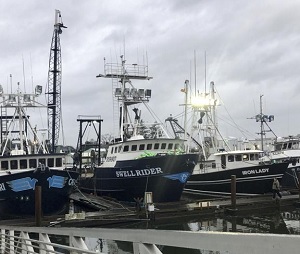
Oregon ground fishing fleet could get loan-interest relief
Bipartisan language was added to the 2020 spending bill Dec. 16 that will forgive more than $10 million in accrued loan interest that was forced on the Pacific Coast groundfishing fleet. The language included in the 2020 spending bill was presented by Oregon’s Democratic Reps. Peter DeFazio and Kurt Schrader and Sens. Jeff Merkley and Ron Wyden. >click to read< 13:03

Crab-price talks set to continue Saturday – processors initially pushed for an open ticket
A fleet leader said Friday night that “We have only one price offer on the coast of $2.75. Fishermen will be continuing talks tomorrow [Saturday] with hopes the processors will come out with a more realistic price offer under current market conditions.” Crabbers are urging an opening price of $3.25, while processors initially pushed for an open ticket, meaning they could pay whatever they determine to be appropriate after crab are delivered. In Northern California, where the season opened on Dec. 15,,, >click to read< 10:09
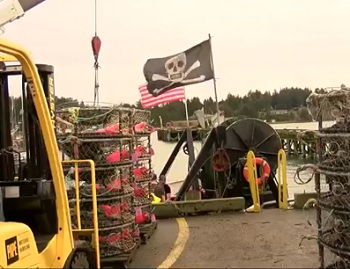
Fishermen adjust after Charleston ice house burns down
Fisherman are still trying to adjust after the Charleston ice house burned down. When the fire broke out last Friday, it initially started an ammonia plume that resulted in a recommended evacuation in the immediate area, according to the Coos Bay Fire Department. Now that the ice house is gone, many fishermen said that it was tremendous loss for a community that relies heavily on fishing to make a living. Video >click to read< 06:52
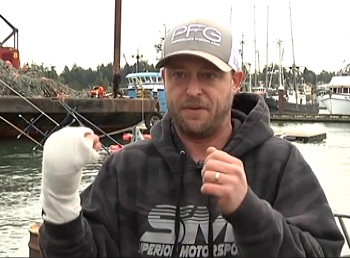
They were trapped inside the wheelhouse at the time of capsize and it was full of water, no air pockets, and Curtis Green from Russell’s Marine fuel pier jumped in the water,”
Curtis Green saw the 40-foot Darean Rose get stuck on a sand bar Thursday as he worked the dock at his family’s business in Charleston, Russell’s Marine Fuel & Supply. “As they were trying to get off, I think that something inside broke from their keel and they started taking on water,” Green said. “As they were trying to get off the sand bar there is when it kind of sluffed off and then we saw it take a turn for the worse and capsized.” Green yelled for someone to do something. Photos, Video, >click to read< 06:14
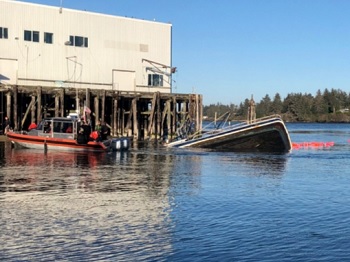
Coast Guard rescues 4 from a grounded, capsized fishing vessel in Coos Bay
A Coast Guard boat crew rescued four people from a commercial fishing vessel Thursday that sank in Coos Bay. The 40-foot Darean Rose capsized and sank shortly after leaving the fuel pier at the Charleston Marina with four people aboard who reported sustaining minor injuries. Watchstanders at Coast Guard Sector North Bend were notified at 2:54 p.m. that the vessel had run aground and capsized right after departing the pier. >click to read< 06:38
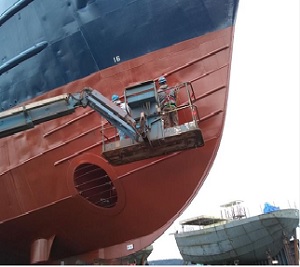
Larsen sees results of legislation at Dakota Creek
It was a little over a year ago that Dakota Creek Industries received a long-awaited congressional waiver to a provision in a federal law that grounded a $75 million Dakota Creek-built factory trawler, America’s Finest, and forced the company to cut its workforce in half to 175.,,, Construction of another large trawler was nearing completion,, Ship construction is booming at the Anacortes shipyard, which also does repair and maintenance of vessels. >click to read< 13:20

Crab fishermen hope new season won’t have same roadblocks. Next big hurdle is to negotiate commercial prices
Crabbers anticipate being able to set up their gear on Dec. 28 with an official start date just days later. But the fishermen still need to finish negotiating this year’s market prices — a process that could indefinitely delay the season’s start if it doesn’t move quickly. It’s illegal in California to sell crabs commercially without a set market price. “We’re definitely worried,” said fisherman Scott Creps. “We’re hoping to get everything worked out and get a full season this year.” >click to read< 07:22
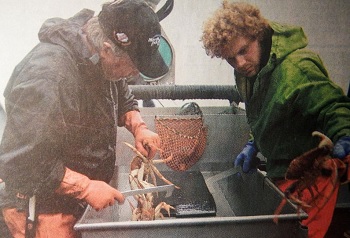
Water Under the Bridge: Dec. 24, 2019 – 10 years ago this week, 2009 in Oregon
Derrick Ray has survived two divorces and 23 grueling winters crabbing in the Bering Sea. He steered boats through 40-foot breakers and stayed up for five days straight — watching imaginary pink elephants fall from the sky — while his boat pulled in a half-million-dollar haul of king crab.Thirty-five years of commercial fishing has taken a toll,,, and other stories, >click to read< 06:36
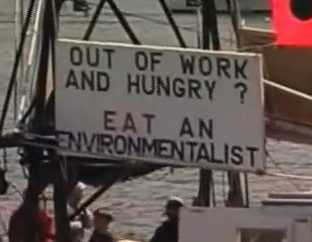
Court: Trump Administration Unlawfully OK’d Longline Fishing Off California
The ruling released late Friday responds to a lawsuit filed by the Center for Biological Diversity and Turtle Island Restoration Network after the fishing permit issued in April exempted vessels from the federal ban on longline gear off California. Longlines stretch up to 60 miles, with thousand of baited hooks intended to catch swordfish and tuna. >click to read< 07:52
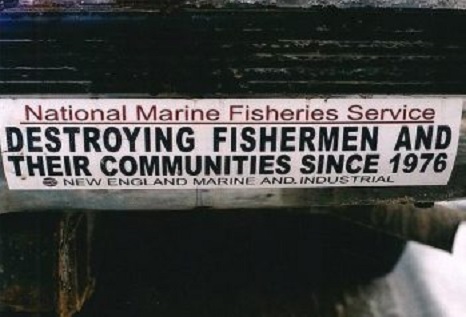
Have you had enough?
Since its inception in 1976, the agency charged with managing our fisheries, the NMFS, has overseen their decline, a decline which in most cases was a product of their own machinations.Usually most ideas the government has for managing our lives are well intended but terribly executed, this was a prime example. NMFS, for all that it was intended to be and do for our fisheries, has failed and in some cases, this wasn’t by mistake, but by design. By John Rice, >click to read< , and the comment venue is open there! 13:37
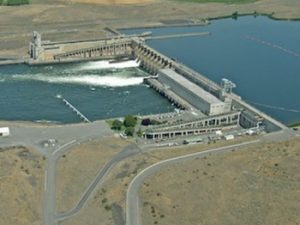
Gov. Inslee Report Weighs Future of Snake River
It’s designed to increase understanding on both sides of the issue. Amy Grondin, a commercial fisher in Port Townsend, was interviewed for the report and says the salmon industry continues to be hurt because of the dams’ effect on fish migration. “Over the last 50 years, the commercial fishing fleet has been asked to compromise and to not fish and cut back their numbers, and annually we see what we’re allowed to catch become less and less,” says Grondin. “We’re really at a tipping point for the fish and the fleets.” Audio, >click to read/listen<11:00






